HIT CHANNEL EXCLUSIVE INTERVIEW: June 2015. We had the great honour to talk with a legendary musician: Shawn Phillips. He has an amazing solo career and played on several Donovan albums (“Fairytale”, “Sunshine Superman”, “Mellow Yellow”) in the ‘60s. He has also collaborated with Eric Clapton, Steve Winwood, Paul Buckmaster, Bernie Taupin and many others. In addition, he performed at the Isle of Wight Festival 1970, sang backing vocals on “Lovely Rita” by The Beatles, recorded with Manos Hadjidakis, jammed with Jimi Hendrix, toured with Yes and gave guitar lessons to Joni Mitchell. In 2014, he released the experimental “Infinity” album, using the Infinity Device. Read below the very interesting things he told us:
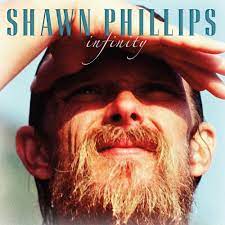 Why you decided to release “Infinity” album, 25 years after its recording?
Why you decided to release “Infinity” album, 25 years after its recording?
I had a system that I set up (ed: Infinity Device) years ago, with the man that I work with, Chuck Ferry, that I could play pretty much anything with. We were doing a concert playing (ed: Tchaikovsky’s) “1812” complete with cannons and cathedral bells with this system. It was way,way before its time. It was way before drum machines and everybody who’s trying to do that today. The reason it wasn’t released was because nobody was interested. It wasn’t financially viable for a record company to release it. They are only interested in music that is going to make a lot of money. So, finally Cary (ed: E. Mansfield) at Varèse Records said: “I think it’s amazing music. Why don’t we put it out there?” So, Chuck took it to Cary and that’s how we got to release it.
What are your plans for the near future? You’re going to tour this summer.
I’m doing a musical for a friend of mine. He has a PhD in Psychiatry, he’s also a composer and he has written a musical called “Peacemaker, The Dreams of Humanity’s Child”. He has asked me to sing the lead role on that and I will do that from October 4th-12th in Hartford, Connecticut. But before that, I’ll be touring in U.S. I’m just gonna do a short tour of Indiana and Minneapolis and then I’ll go up to Quebec and I’ll do maybe 10 concerts in Quebec. I ‘ll be here (ed: Port Elizabeth, South Africa) until mid August.
Are you proud of the classic status that “Contribution” and “Second Contribution” albums have (both released in 1970)?
Yes, of course I am! Sure, I am. I just wish the market worked with music like that today. Today, for a musician who wants to explore the art of music it’s very-very difficult. The music and the lyrics that are being written, are written pretty much for a third grade child level. There are a couple of things out there -Hozier is nice- but for the most part nobody is trying to say anything in music anymore. I find that very difficult for a lot of artists, because I know a lot of singer-songwriters that are absolutely amazing: David Rovics is one. If you are going to work with the art of music, you need to use your intelligence.
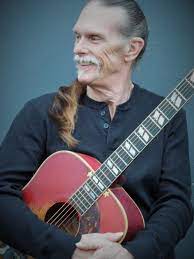 Do you think your solo career should have become more popular?
Do you think your solo career should have become more popular?
I was very popular in the ‘70s, but I was popular because I had the machine behind me. I had the music machine and it was getting out to the public. That’s the bottom line for any artist. The bottom line is: Do people like it. Because if they don’t like it, they are not going to buy it. And people liked it. But the face of music changes and it did. Today, if I had the same machine working, like A&M Records and RCA and those record companies that I was with, I will still be selling a lot of CDs. I make CDs but nobody knows there are out there. Because I’m the only one who put it out there and the only place I am able to put it out on, are places like Facebook and social media.
Did Led Zeppelin copy their version of “Babe, I’m Gonna Leave You” (1969) from your song “Storm” (1965)?
Yes, they did! That’s correct. Yes.
Do you have clear memories of the Isle of Wight Festival 1970?
(Laughs) Well, I don’t know how fuckin’ clear they are. I was pretty stoned then. I wasn’t even supposed to play. The thing I remember the most is that somebody cancelled and they said: “Oh, this guy, Shawn Phillips is here and he can play a set”. And they said: “Can you do a 45 minute set?” and I said: “Yeah”. So, I got up and I did a nice set and got a double standing ovation from all those people. The other thing I remember is standing backstage when Miles Davis played. That was fantastic, Thodoris! That was an absolutely mesmerizing moment. I mean, the guy would stand there and you could feel this groove, this jam going on and he would walk up to the microphone and play 10 notes on the horn in the entire jam. It was amazing.
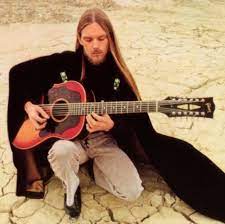 How did it happen to sing backing vocals on The Beatles’ song, “Lovely Rita”?
How did it happen to sing backing vocals on The Beatles’ song, “Lovely Rita”?
I was friends with George (Harrison), Paul (McCartney) and John (Lennon), not so much Ritchie (Ringo Starr). I was friends with them and I was with a friend of mine named Steven Thunders and they invited us to the studio. And when we got there, they were doing two things: they were doing the background vocals for “Lovely Rita” and Paul said: “Hey man, we need backup vocals on that”, so I said: “Ok”. David Crosby (ed: CSNY, The Byrds) and I, sang backup vocals on that. Then, we just came around the studio and the next thing that happened was Paul started putting the last piano chord on “A Day in the Life”. They used 22 pianos.
You gave some sitar lessons to George Harrison before he met Ravi Shankar.
I spent three weeks with George. I would set up a meeting, when I was busy and I ‘d go over to his house, we had dinner and would sit down and play some songs and I was sitting down and teaching him about the instrument.
Did you get on well with Mickie Most (Donovan, The Animals, Jeff Beck Group producer)?
Yeah, I did! I got on quite well with Mickie. He was a good guy. The only thing that I didn’t like about working with Mickie and Donovan, was that I wrote the music for “Season of the Witch” and they never put that on the publishing contracts. In 2011, when I played with Don at the Royal Albert Hall, he acknowledged in front of the audience that I wrote the music.
In 2011, you played the “Sunshine Superman” album at the Royal Albert Hall with Donovan, Jimmy Page and Danny Thompson (Pentangle). How emotional was that night?
I don’t know, I am always pretty emotional. I mean, the thing I remember the most was: I met Jimmy before Led Zeppelin was even a concept, and when I walked in the second day of the rehearsals, Jimmy was there with his guitar tech setting up and I walked in the room and he looked at me and he said: “I know you” (laughs). And I said: “Oh, what’s my name?” and he said: “Your name is Shawn”. I said: “You ‘ve got a fuckin’ memory, man”. And he said: “No, no. I remember you, man. I remember those sessions we did”. So, that was an interesting moment.
 You wrote lyrics and did vocals on the Manos Hadjidakis’ song “The Ballad of Senses and Illusions” for the film, “The Martlet’s Tale” (1970). How did you come into contact with Manos Hadjidakis?
You wrote lyrics and did vocals on the Manos Hadjidakis’ song “The Ballad of Senses and Illusions” for the film, “The Martlet’s Tale” (1970). How did you come into contact with Manos Hadjidakis?
I came in contact with Manos through a man named Michael Kamen (ed: composer and Pink Floyd and Queen arranger). Michael introduced me to Manos in New York. Let me tell you something, to this day the thing I remember most about Manos is: When you walked in his apartment, what you smelled was a cologne called Vetiver. That was what you smelled when you walked in his apartment: Gauloises cigarettes and Vetiver. And I wear Vetiver to this day. I put it on this morning.
Was it an interesting experience to work with Manos Hadjidakis?
Yes, he was wonderful. He was a wonderful man. He called me “The Maria Callas of the pop world”. I met him in New York and then we worked together in Italy.
What is the secret of your longtime collaboration with Paul Buckmaster (composer and arranger for Rolling Stones, David Bowie, Elton John)?
Friendship and great-great respect for his musicianship.
In 1989, you collaborated on two songs with Steve Morse and Steve Walsh of Kansas. Why these songs were never released?
That’s right. Oh man, you really know your history! Jesus! Amazing! You are absolutely right. I did. We worked on those in my garage when I lived in California. I don’t know why they remained unreleased. Somebody made that decision. I had no idea who made that decision. I wrote the lyrics on one of them.
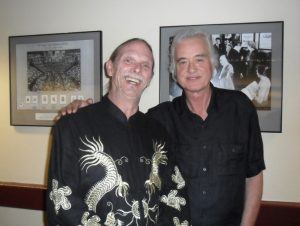 You gave guitar lessons to Joni Mitchell when she was a waitress.
You gave guitar lessons to Joni Mitchell when she was a waitress.
I was living in New York and I was getting booked in different places. And during those days, when you were booked into a club or a coffee house, you were booked for about two weeks. I was booked into the Louis Riel Coffee House, in Saskatoon, Saskatchewan. Joni was a waitress there and she said: “Would you teach me guitar?” and I said: “Yes” and I saw that she was immediately comfortable with the instrument and I knew she would play. I had no idea she would do what she did but yes, we became friends and we remain friends ever since.
When did you jam with Jimi Hendrix?
At Chas’ (ed: Chandler –Hendrix manager and The Animals bass player) house. I knew Chas, who was his manager and we wandered over there. A lot of people don’t know that Jimi was an expert on a blues player named Huddie Ledbetter, they called him Lead Belly. Jimi was an expert on him and Jimi and I would jam and play Lead Belly songs.
Why the manager of Yes threw you off the tour when you opened for them in 1972?
Because I got better reaction from the audience. They didn’t want an opening act that went that well. I remember that: The first night that I played, was at The Rainbow in London and I was doing songs from “Second Contribution” at the time, and on one of those things I used distortion guitar and the guy pushed the sound system to the limit, when I went into that, and they could feel it in the dressing room. They would think: “What the fuck is that?” They came out and they watched until the end of the set. I opened for them maybe four times and they said: “Now, we want a different opening act”.
Can you tell us a few words about your friendship with Brian Jones (Rolling Stones)?
Again, it was one of those situations where you have a lot of musicians that are all hanging up together in London. Because I played sitar, Brian and I, would hang up together and play and jam and smoke, just as friends hanging out.
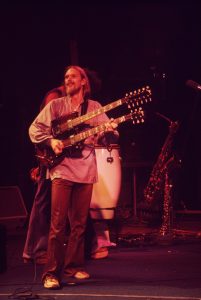 Do you think the collapse of the major recording labels is a kind of justice for their corporate greed all these years?
Do you think the collapse of the major recording labels is a kind of justice for their corporate greed all these years?
Yes, actually I do. The music industry, especially in the last 10 years, has done more work to destroy music. Joni said something very true recently. An executive from Sony Music came over and asked her to do something and she declined. He said to give her hair a cut and she declined to do it and he said: “Why?” She said: “Because you just called me” He said: “We’re not looking for talent any more. We are looking for someone that has a look and he’s able to follow directions”. That’s what one of the major executives from Sony Music said: “We are not looking for anybody with talent. We are looking for someone who has a look can follow directions”.
Why you moved to Positano, Italy in 1967?
When I was in England, my work permit ran out and they said: “You have to leave the country for three months” and the man that I sing about (ed: “The Ballad of Casey Deiss” from “Second Contribution” album), Casey Deiss said: “Go down to Positano and stay there for the three months and then come back. Meet this guy, Giulio Gargiulo and then come back. Meet Giulio and he will find you a place to stay”. And I got there and I just never moved for the next 14 years.
Keith Richards and Mick Jagger wrote the song “Midnight Rambler” in Positano in 1969. Did you meet them when you lived there?
Yes, I did. Keith came up to my house more than once. Mick stayed pretty much on his own. But Keith came up to my house three or four times. Keith is a good guy.
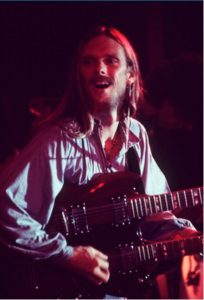 Are you happy with the comeback of the vinyl records?
Are you happy with the comeback of the vinyl records?
Yes, I am. Although, I have never been that averse to CD’s. I think it’s in how you produce a record. A lot of people say: “Oh, the CD sounds this cold”. You can get that warm analog sound on CD, just as well as you do on vinyl.
Have you ever turned down an interesting work offer because you were busy or for any other reason?
Yes, there was something just recently: Pete Seeger’s 90th birthday at Madison Square Garden. Bob Ezrin asked me if I wanted to do it and I couldn’t, because I had a concert at The Guthrie Theater in Minneapolis. Bob is a very good guy.
A huge “THANK YOU” to Mr Shawn Phillips.
Shawn Phillips Official website: http://www.shawnphillipsmusic.com
Shawn Phillips Official Facebook page: https://www.facebook.com/ShawnPhillipsMusic

